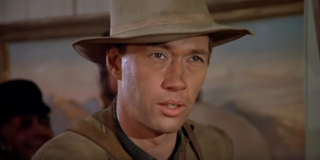David Carradine's Kung Fu Is Getting A TV Reboot With Some Big Changes

Prepare yourselves, Grasshoppers. The 1970s cult classic show Kung Fu is being prepped for another go-round on the small screen, but there are some changes afoot. The drama, which starred David Carradine as a Shaolin monk, will see a few storyline changes to help bring the show into the modern day, and it just so happens that one of those changes will involve the new series focusing on a female protagonist. I'm already getting Colleen Wing in Iron Fist vibes from this idea, and I have to say that I'm really into it.
This time around, Kung Fu, which will take its inspiration from the original and has been put into development at The CW (home to all worthy skilled-and-hot-young-person-in-dangerous-situation shows), will feature a young Chinese American woman whose quarter-life crisis leads to her dropping out of college and eventually going "on a life-changing journey to an isolated monastery in China."
When she does return home, though, she quickly sees that the town she once knew has changed dramatically, with it being overwhelmed by corruption and crime. So, she uses her hard earned Shaolin moral code and martial arts skills to fight crime and protect her friends, family and neighbors. But, because that just isn't enough of a difficult job, she's also trying to find the dangerous assassin who killed her Shaolin master as now has their sites set on her.
As I said earlier, I'm already on board with this badass idea. Bring me Kung Fu!
According to Deadline, the master of The CW and super-producer extraordinaire, Greg Berlanti, will be executive producing Kung Fu. The hour long drama comes from the Blindspot team of Christina M. Kim and Martin Gero, who, respectively, write / executive produce and created / executive produce the action-packed NBC show. Sarah Schechter will also executive produce, and Kung Fu is being brought to us by Warner Bros. TV, which has Kim, Gero and Berlanti Productions under deals.
Now, aside from the obvious change from a male to a female protagonist, there are some other, major differences in what we'll be seeing in this iteration of Kung Fu. The David Carradine series, which ran for three seasons from 1972-1975, saw him play Kwai Chang Caine, the orphaned son of an American man and a Chinese woman in 1800s China. Caine undergoes training at a Shaolin Monastery, becoming a monk and talented martial artist.
But, when Caine's mentor is killed by the emperor's nephew, he takes matters into his own hands and kills the man in retaliation. This leads to Caine having bounty hunters on his tail, so he abandons China for a life roaming the old West and helping those in need with his special skills, as he tries to find his half-brother.
CINEMABLEND NEWSLETTER
Your Daily Blend of Entertainment News
Alright, as much as I really like the revised Kung Fu idea, there's no denying that the original show had a pretty epic premise. We probably won't get any shots of the new protagonist riding horses or wearing a dusty cowboy hat, but this version is sure to feature a ton of ass-kicking action from our lone-gunslinger...with the exception of guns, obviously. You know, because her hands are her guns.
Anyway, right now Kung Fu is still in the very early planning stages, so there's no word on if or when we might actually get to see the show on The CW, but stay tuned to CinemaBlend and we'll be sure to let you in on any developments as soon as possible. In the meantime, be sure to keep up with what's on television this season with our fall TV premiere guide!

Covering The Witcher, Outlander, Virgin River, Sweet Magnolias and a slew of other streaming shows, Adrienne Jones is a Senior Content Producer at CinemaBlend, and started in the fall of 2015. In addition to writing and editing stories on a variety of different topics, she also spends her work days trying to find new ways to write about the many romantic entanglements that fictional characters find themselves in on TV shows. She graduated from Mizzou with a degree in Photojournalism.
Most Popular




